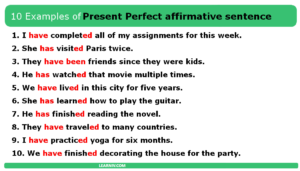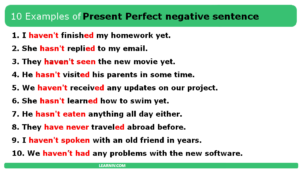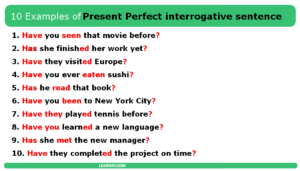The Present Perfect tense is a grammatical construction utilized to depict actions or occurrences that transpired in the past but bear relevance to the present. It accentuates the outcome or impact of the action rather than its precise timing. Its formation entails the utilization of the helping verbs “have” or “has” followed by the past participle of the principal verb. The Present Perfect tense finds application in recounting experiences, finished actions, or ongoing situations that originated in the past and persist up to the present moment. It is also employed to narrate recent past events or convey actions that have taken place on multiple occasions.
50 Examples of sentences of Present Perfect Tense
Here are fifty examples of sentences in the Present Perfect tense:
- I have finished my homework.
- She has visited Italy.
- They have lived in this city for ten years.
- He has read that book.
- We have seen that movie before.
- The team has won the championship.
- Have you ever traveled abroad?
- She has never tasted sushi.
- They have already left for the airport.
- He has just arrived home.
- We have visited many countries.
- The company has achieved its sales targets.
- Have you seen my keys anywhere?
- She has studied French for two years.
- They have experienced many challenges.
- I have eaten dinner already.
- He has forgotten his password.
- We have worked together on several projects.
- The baby has just fallen asleep.
- Have you ever been to a concert?
- She has won several awards.
- They have known each other since childhood.
- I have never tried rock climbing.
- He has finished his presentation.
- We have had a productive meeting.
- The train has departed from the station.
- Have you visited the new art exhibition?
- She has improved her English skills.
- They have purchased a new car.
- I have received your message.
- He has broken his phone.
- We have explored different hiking trails.
- The restaurant has closed for the day.
- Have you heard the latest news?
- She has completed her degree.
- They have donated to charity.
- I have seen that movie multiple times.
- He has achieved his personal goals.
- We have won the game.
- The project has been completed successfully.
- Have you ever tried skydiving?
- She has published a book.
- They have worked hard on this project.
- I have lost my keys.
- He has traveled to many countries.
- We have sung together in a choir.
- The team has practiced diligently.
- Have you finished your assignment?
- She has painted a beautiful picture.
- They have attended the conference.
Look at other examples of present perfect tense.
More examples of Present Perfect sentences
Other examples:
When to use present perfect tense
The Present Perfect tense is used in English to express actions or states that have a connection to the present, even though they occurred in the past. Here are some specific situations when the Present Perfect tense is commonly used:
- Unspecified time in the past: When the exact time or date of an action is unknown, irrelevant, or not mentioned, the Present Perfect tense is used. For example: “I have visited Paris.” The focus is on the experience or result of the action rather than when it took place.
- Actions that started in the past and continue in the present: When an action began in the past but is still ongoing or has an impact on the present, the Present Perfect tense is appropriate. For example: “She has lived in this city for five years.” The emphasis is on the duration or continuity of the action up to the present moment.
- Recent past events: The Present Perfect tense is often used to talk about actions or events that happened in the recent past and have a relevance to the present. For example: “They have just arrived home.” It implies that the action happened very recently and may have consequences or implications for the current situation.
- Experience or accomplishments: The Present Perfect tense is used to talk about experiences or accomplishments in life. For example: “I have traveled to many countries” or “He has written several books.” It emphasizes the overall experience or achievement up to the present point.
- Multiple occurrences or repeated actions: When actions have happened multiple times in the past, the Present Perfect tense is used. For example: “She has seen that movie three times.” It suggests that the action has occurred on different occasions up to now.
It’s important to note that the specific context and intention of the speaker or writer determine the choice of using the Present Perfect tense. Understanding these common situations will help you apply the tense accurately in your communication.
50 examples of Present Perfect Form of verbs
Here is a table showing the verbs in the first column and their corresponding present perfect forms in the second column:
Please note that the present perfect forms in the table represent the combination of the auxiliary verb “have” with the past participle form of each verb, which indicates actions or events completed in the past with relevance to the present.


